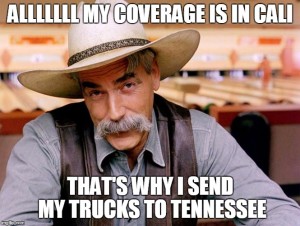While still a legal tadpole, that is, a law student, your humble blogger took a class called contract law. Therein, I learned that part of a contract is a “meeting of the minds.” That is, at least at formation, the parties have to agree on what’s going on. Right?
Well, that becomes tricky when there is a dispute between the employer and the insurer about the nature and extent of the policy covering (or allegedly covering) an injury.
For example, when Bob’s Brick Layers and Heavy Demolition Company gets a workers’ comp policy and lists 5 employees, all engaged in clerical work, XYZ Insurance Company may be a bit surprised when it gets a claim on the same policy for a worker crushed by bricks at a construction site or blown to bits doing demolition work. After all, mail clerks and secretaries typically don’t lay brick or engage in demolition work. (If this is not true, I may need to assign new tasks to my own staff).
On the other hand, one can see how an insurance company receiving $X in premiums and now facing $X-times-100 in benefits exposure might want to make sure it wasn’t bamboozled into providing coverage for risks grossly disproportionate with the premiums charged. The hazards visited on a mail room clerk and a brick layer, tend to be different in the likelihood and extent of harm, no?
Recently, the Court of Appeal denied review in the case of Berrios v. EJ Distribution Corporation, after the WCAB adopted and incorporated an Arbitrator’s finding that the insurer could not unilaterally rescind coverage for the defendant-employer. Therein, the employer obtained a workers’ compensation policy and specifically listed that his truck drivers do NOT operate outside of the state of California. Of course, the claimed injury occurred when a truck driver hurt his back while in Tennessee.

In response, the insurer refunded the entirety of the premium, rescinded the coverage contract, and denied the claim, which, of course, got the Uninsured Benefit Trust Fund involved. The matter was referred to arbitration, and the arbitrator found that, even though “the employer’s representations denying out-of-state work were false,” the arbitrator also found fault with the insurer for failing to investigate the employer’s operations. The arbitrator went further to note that “[t]here cannot be an exclusion under the California Insurance Code unless one is recognized under an endorsement addendum and approved by the Department of Insurance.”
The insurer’s remedies, according to the arbitrator, were to increase policy premiums to reflect out-of-state work, or to cancel the policy going forward and sue the employer for fraud and damages (and possibly declaratory relief that the policy was invalid at its inception). However, the unilateral rescission of the policy was invalid.
Another point of persuasion for the arbitrator was that the insurer offered no proof that, at the time of the inception of the insurance policy, the employer was involved in out-of-state operations. Surely, a deposition of the injured worker or a subpoena of mileage records for the trucks (you know, like the type of logs meticulously kept to list as a deductible expense during tax time) would have answered this question.
Is it really fraud when, at the time the statement was made, it was true, but subsequent events rendered it no longer true? Isn’t that more of a breach of contract, or some other allegation, rather than fraud?
If you have a chance, this is a great opinion to review because of the summary of case-law pertaining to rescission of coverage. There are even some great points not made in the opinion that your humble blogger will keep under his hat for a later post. This is an issue that comes up now and then, and sometimes even triggers the ever-expensive process of arbitration.
Happy Monday!
